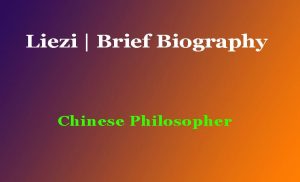Liezi | Brief Biography
Liezi | Brief Biography
Liezi was a Chinese philosopher who lived during the Warring States period in ancient China, around the 6th century BCE. He was a representative of the Taoist school of thought, and his teachings, along with those of Laozi and Zhuangzi, are considered to be some of the earliest expressions of Taoist philosophy.
Unfortunately, there is very little information available about Liezi’s life and personal history. In fact, some scholars have questioned whether he actually existed or if he was a legendary figure created to embody Taoist teachings.
What is known about Liezi is largely based on the book that bears his name, “Liezi,” which is a collection of philosophical dialogues, allegories, and parables that express Taoist ideas. The book was compiled and edited during the Han dynasty (206 BCE to 220 CE) and is considered one of the three major works of Taoist philosophy, along with the Tao Te Ching by Laozi and the Zhuangzi.
In Liezi, the philosopher is depicted as a wise and enlightened individual who uses humor, wit, and irony to convey his teachings. He emphasizes the importance of living a spontaneous and effortless life, in accordance with the natural flow of the Tao, or the underlying force of the universe. He also advocates for a life of non-action, where one allows events to unfold without trying to control or manipulate them.
One of the most famous stories in the Liezi is the allegory of the “Riding the Wind,” in which the philosopher describes a man who was able to fly effortlessly through the air simply by becoming one with the wind. This story is often interpreted as a metaphor for the idea of living in harmony with the natural world, and letting go of the desire to control and dominate.
Another key theme in Liezi is the concept of wuwei, or non-action, which is a central principle of Taoist philosophy. According to this idea, the best way to achieve one’s goals is to stop striving for them and simply allow them to come to fruition naturally. Liezi suggests that people who engage in excessive activity and struggle only create obstacles for themselves, and that the key to a harmonious and fulfilling life is to cultivate inner peace and let go of the desire for control.
In conclusion, although very little is known about Liezi the person, his teachings have had a lasting impact on Taoist philosophy and have been widely studied and debated by scholars and practitioners throughout history. The Liezi continues to be an important work for those seeking to understand the Taoist perspective on the meaning of life and the nature of the universe. 0 0 0.
N. B. This article originally belongs to the book, ‘Brief Biographies of Ancient Thinkers and Writers‘ by Menonim Menonimus.
Books of Biography by M. Menonimus:
- The World Writers-Brief Biographies
- Introduction to World Writers
- Introduction to World Personalities
- Love of Reputed Persons ..
Additional Searches:











